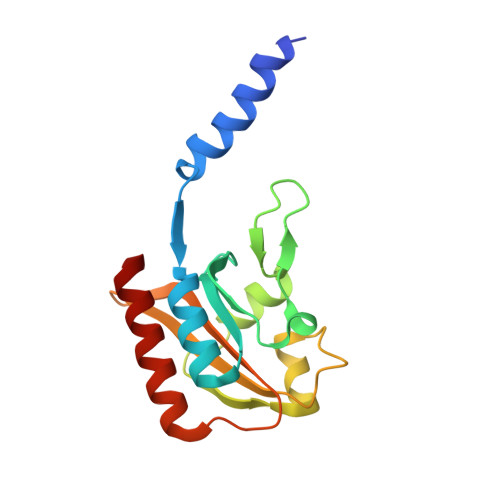Impact of CodY protein on metabolism, sporulation and virulence in Clostridioides difficile ribotype 027.
Daou, N., Wang, Y., Levdikov, V.M., Nandakumar, M., Livny, J., Bouillaut, L., Blagova, E., Zhang, K., Belitsky, B.R., Rhee, K., Wilkinson, A.J., Sun, X., Sonenshein, A.L.(2019) PLoS One 14: e0206896-e0206896
- PubMed: 30699117
- DOI: https://doi.org/10.1371/journal.pone.0206896
- Primary Citation of Related Structures:
5N0L - PubMed Abstract:
Toxin synthesis and endospore formation are two of the most critical factors that determine the outcome of infection by Clostridioides difficile. The two major toxins, TcdA and TcdB, are the principal factors causing damage to the host. Spores are the infectious form of C. difficile, permit survival of the bacterium during antibiotic treatment and are the predominant cell form that leads to recurrent infection. Toxin production and sporulation have their own specific mechanisms of regulation, but they share negative regulation by the global regulatory protein CodY. Determining the extent of such regulation and its detailed mechanism is important for understanding the linkage between two apparently independent biological phenomena and raises the possibility of creating new ways of limiting infection. The work described here shows that a codY null mutant of a hypervirulent (ribotype 027) strain is even more virulent than its parent in a mouse model of infection and that the mutant expresses most sporulation genes prematurely during exponential growth phase. Moreover, examining the expression patterns of mutants producing CodY proteins with different levels of residual activity revealed that expression of the toxin genes is dependent on total CodY inactivation, whereas most sporulation genes are turned on when CodY activity is only partially diminished. These results suggest that, in wild-type cells undergoing nutrient limitation, sporulation genes can be turned on before the toxin genes.
Organizational Affiliation:
Department of Molecular Biology and Microbiology, Tufts University School of Medicine, Boston, MA, United States of America.















